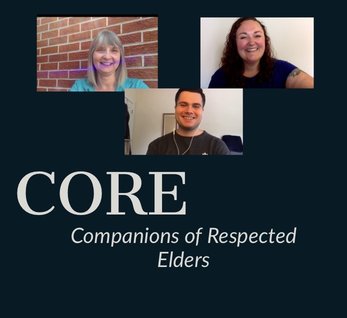WKU News
English Department Helps Lead CORE in New Directions to Assist Community Elders during COVID-19
- Jessica Folk and Mary Johnson
- Wednesday, July 29th, 2020

The implementation of physical distancing is an essential step in reducing transmission of the COVID-19 virus. However, physical distancing may lead to social isolation and loneliness. Although loneliness and social isolation can affect anyone, the elderly are particularly vulnerable, especially under the current conditions of the pandemic.
The Companions of Respected Elders organization (CORE) strives to reduce the effects of increased social isolation among older members of the community. “It may help to think of the isolating effects our circumstances have on our own family and community members—young and old(er). Overdoses and suicides have increased each month—April, May, June. Knowing someone is taking the time to interact can help us get through feelings of disparity,” said WKU English professor Dr. Trini Stickle. Dr. Stickle, along with WKU English professor Jessica Folk, are faculty sponsors for CORE.
This summer, CORE is experiencing a bit of a hiatus as a large group. Instead, Cameron Fontes, a WKU senior English major from Louisville, and Samantha Eaton, a Hopkinsville senior and history major, are developing smaller projects within CORE to continue into the fall 2020 semester.
“We’re not entirely sure what our changes will look like this fall as we are in a holding pattern until the facility we work with opens to visitors again. We are exploring the possibility of potentially doing some virtual visits and doing activities with the CORE group like sending cards to residents around the holidays. Essentially, we understand that now, more than ever, the elders in care are feeling even more isolated and we’d like to help ease that feeling of isolation as much as we can, so we are exploring options that might help us do just that,” said Folk.
As guidelines alter how individuals interact within the community, CORE volunteers have had to adjust their methods to connect with elders in the community. “We’ve learned to think on our feet and be flexible. The world may be more shut down than usual, but storytelling and connecting to elders are still enormously important things,” said Folk. Professor Folk, Dr. Stickle, Fontes, and Eaton are currently involved in the Silver Streaming project, which is comprised of brief, webinar-style videos about storytelling in the TimeSlips method and are working with older writers, virtually and in person. TimeSlips, founded by MacArthur Fellow Dr. Anne Basting, consists of artists and caregivers who bring creativity and meaning to people in their later years of life. “That’s been one of the most important things we’ve done during this COVID-19 pandemic: adapt,” said Folk. “More and more of our programming will become virtual over the next year and learning what those needs are and what changes we’ll have to make to meet those needs has been really important.”
Lockdowns and social restrictions have created an abrupt feeling of separateness and isolation unlike anything most of us have ever known, but through her work with CORE, Folk believes the pandemic crisis has also created opportunities for new connections. “I’ve seen people connect in new and meaningful ways throughout this time,” she said. “Whether it’s via more frequent and intentional video chats, online programming, activism, webinars to learn about adjusting to this current world, or just taking the time to reflect on what’s really important, COVID-19 has shown us that language, reading, communication, and comprehension of ideas are just as important as they always were - perhaps even more so with face-to-face interactions being limited in our daily lives.”
Folk notes that English majors have the skills to help rebuild our world and make it stronger as we prevail over pandemic challenges. “English majors are uniquely positioned to tell and understand stories and language in a way that others may not. Whether you’re helping a business adjust their website or social media to reflect the shifting markets, or telling stories against the backdrop of a pandemic, or analyzing the writing emerging from this time period, you are actively utilizing those skills from the major.”
Folk and Dr. Stickle encourage English majors and minors to volunteer with CORE and help brainstorm a new direction for a program that is typically hands-on. “We help elders tell stories. Hearing those stories and providing those elders the opportunity to communicate those stories in meaningful ways is exceedingly important. The pandemic has separated us in drastic ways. Storytelling is one tool we can use to bring people back together,” said Folk.
Some of the links on this page may require additional software to view.

